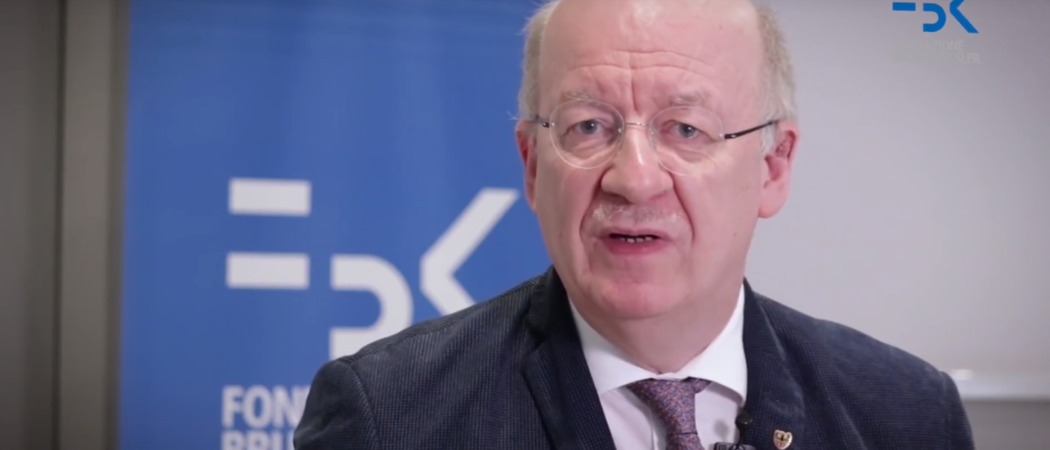In his 20 years as head of Germany’s biggest AI research lab Wolfgang Wahlster has seen the tech hype machine splutter three times. As he hands over to a new CEO, he warns colleagues: ‘Don’t over-promise’

By now everyone will have heard that we are in the midst of an AI revolution in which computers are about to upend the way we live, learn and work.
But for Wolfgang Wahlster, the computer scientist who has just ended a 20 year stint as CEO of the German Research Centre for Artificial Intelligence, that greatly underestimates the distance between AI and its human counterpart. We’re years away from a game changer in the field, he believes.
“I always warn people, one should be a bit careful with what they claim. Every day you work on AI, you see the big gap between human intelligence and AI,” Wahlster told Science|Business.
The hype and hysteria around the imminence of human-level AI is familiar to Wahlster, who says the forecasts may well fall short. “I have already seen three hype cycles for AI – it’s very important, as I tell our researchers, not to over-promise and under-perform.”
Wahlster stepped down from his position as Germany’s foremost commercial AI scientist in February, having watched the astounding explosion of AI into a multi-billion euro industry in the last half-decade.
His lab, founded in 1988, now has facilities in the five German cities of Berlin, Bremen, Kaiserslautern, Osnabrück and Saarbrücken. The centre has an annual budget of nearly €50 billion, derived from a mix of public and private funds. All the big German car manufacturers chip in money, as do insurance companies and technology giants like Google.
While AI is showing promise in many areas, Wahlster doesn’t think computers will outstrip human capabilities within many of our lifetimes. The techniques which underpin most of what people think of as ground-breaking AI are not yet reliable, he said.
“There is a hype around deep learning,” he said. “People talk about how good [the tech] is, but they don’t mention its limitations. It’s specific systems trained to do specific tasks in narrow fields.” Much of the hyperbole over AI and these self-aware or “conscious machines” comes from the US, Wahlster said.
He explains the fallibility of neural networks, in which machines ‘learn’ by recognising patterns. These can then be applied to speech recognition or navigating self-driving cars.
“You try to teach a neural network how to recognise certain words. One example is ‘bank’, which could mean a financial institution, or something you sit on in a park. The system has no problem understanding one of these definitions, but it gets stuck if you introduce the other. The more knowledge and training you give it, the less intelligent the system gets.”
If you succeed in getting AI to do one task, and then you add another, the initial task will suffer, he said.
So while AI may one day deliver some unimagined leap forward, and is supposedly destined to transform millions of lives, it’s going to take patience, said Wahlster.
A case in point is the struggle to make self-driving cars reliable. One recent project at his lab involved a car that had been fed too much training material. “It found this pseudo-correlation between the angles of the sun, and steering. It thought that, at a certain angle of the sun, it should turn right. This is the kind of challenge you face every day.”
On the other hand, there are examples of applications for machine learning that are ready to make an impact today. “Big insurance companies can use these systems to test for fraud by comparing photos of houses before and after a storm, for instance,” he says.
Wahlster is succeeded at the German AI lab by a former PhD student of his, Jana Köhler, who spent part of her career at IBM and Schindler. He will remain as an adviser and will consult for industry.
“At the beginning, in the centre we were quite small – 50 people. Now we are almost 1,000. When you compare us with AI labs in the US or Japan or China, I don’t know of a bigger one than ours,” Wahlster said.
Europe’s AI future
But if this manpower is impressive, Wahlster acknowledges that in many respects Europe lags other parts of the world on AI. “China decides everything faster, in Europe we have to wait, wait, wait,” he says.
In basic research, “we are a little bit better than the others. Most of the AI publications are written by Europeans; second is China, third is US,” he says.
As the race to develop more advanced AI systems accelerates, wealthy tech companies from Google to Facebook are raiding computer science departments in Europe for AI talent, luring away top European professors with hefty pay packages. “It’s salaries in Europe – they are not comparable with what you have elsewhere,” says Wahlster.
In other areas, including legislation, Europe may be ahead of the game, Wahlster says. Stricter oversight of personal data in Europe, introduced by the EU’s many-tentacled General Data Protection Regulation (GDPR) last year, may curtail researchers today, but in the long run, will turn to Europe’s advantage.
“It’s a bit more work for everyone now and it’s more expensive, but I think it’s a movement – people want to use GDPR because they think it’s better than some aggressive, laissez-faire system,” said Wahlster. “People are increasingly critical of technology. And I think that in Europe we’ve seen that more quickly than other places.”




 A unique international forum for public research organisations and companies to connect their external engagement with strategic interests around their R&D system.
A unique international forum for public research organisations and companies to connect their external engagement with strategic interests around their R&D system.